What’s Hiding Behind Russia’s Calls for Peace in Nagorno-Karabakh: Voice of America
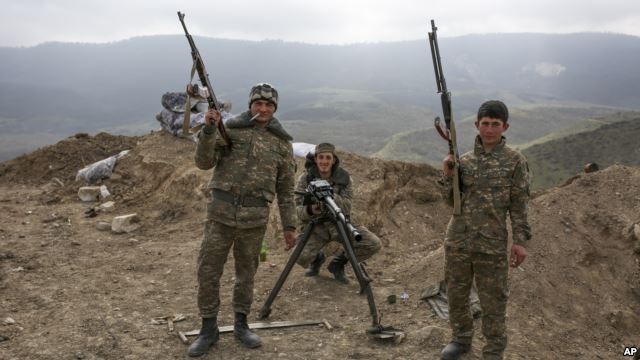
The presidents of Russia, Iran and Azerbaijan – Vladimir Putin, Hassan Rouhani and Ilham Aliyev, respectively — are planning to hold security talks in Baku soon.
While no further details of the planned meeting have been announced, Russian Foreign Minister Sergei Lavrov said last week in a meeting in Baku that security cooperation in the Caspian Sea region, which he said has become a “corridor” for the “trafficking” of terrorists, will top the meeting’s agenda.
The announcement of the Putin-Rouhani-Aliyev summit followed a rapid escalation of the “frozen conflict” between Azerbaijan and neighboring Armenia over the disputed territory of Nagorno-Karabakh, which officially is a part of Azerbaijan.

Since the end of separatist war in 1994, the region has de facto been under the control of the local Armenian forces and the Armenian military, and low-level armed clashes have occasionally broken out.
Moscow and Tehran are facilitating the peace talks between the warring sides as Armenia and Azerbaijan accuse each other of violating the cease-fire, reached last week after U.S. Secretary of State John Kerry and Lavrov spoke by telephone.
The United States encouraged Armenia and Azerbaijan to resume peace talks and avoid further escalation.
History of conflict
The fighting that erupted in Nagorno-Karabakh last weekend is the worst outbreak of violence in the history of the conflict. According to The Associated Press, at least 64 people were killed in the fighting.
Since the emergence of the conflict in 1994, Russia has been a key member of the Minsk group, an international body created to provide a “road map” for peace in Nagorno-Karabakh.
The Minsk group showed little success, and the group’s format was gradually marginalized, at least in part due to Moscow’s attempt to “sabotage” the efforts, said Paul Goble, an American expert on Russia who served as a U.S. State Department special adviser on Soviet nationality issues and Baltic affairs.
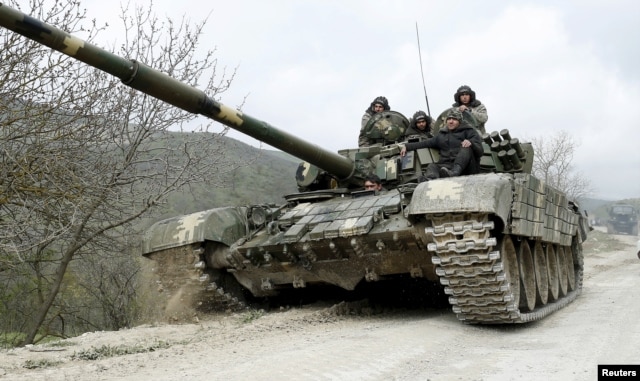
“Moscow has been the prime reason why there has been no movement in the Minsk group talks,” Goble said. “Moscow was happy to keep this low-grade conflict that could be used to Russia’s benefit.”
Despite its public posture of being committed to resolving the conflict, he said, Moscow continues to play a double game, trying to use the recent escalation of violence to its advantage.
Goble believes Russia will desert its current client state, Armenia, as soon as developments allow the Kremlin to claim credit for returning to Azerbaijan what Baku calls its “occupied territories.”
“There is no doubt in my mind that, for Moscow, Azerbaijan is the prize and Armenia is the tool for achieving that,” he said, adding that Azerbaijan’s geopolitical location and rich oil resources are what interest the Kremlin.
IS allegation
On April 4, one day before Armenia and Azerbaijan agreed to stop fighting after several days of intense combat, LifeNews, a Russia-based TV station, aired a program alleging that Azeri forces were using Islamic State fighters in the battle in Nagorno-Karabakh.
The report claimed that Azerbaijani IS militants in Syria had crossed Turkish territory to reach Azerbaijan and join the fight against the Armenians in the contested territory.
Azerbaijan’s Defense Ministry rejected the allegations, charging on April 5 that the LifeNews report was “sabotage by Kremlin media” aimed at raising questions about Azerbaijan’s “sovereignty, territorial integrity and inviolability.”
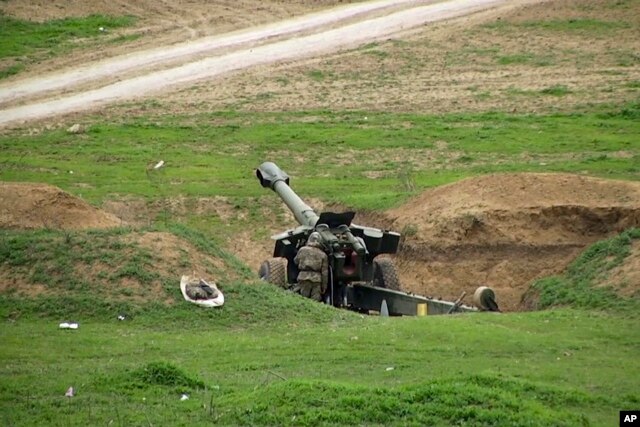
The ministry added that any member of a terrorist organization who attempted to enter Azerbaijan for any reason would be prosecuted.
Following the LifeNews report, its TV crew in Azerbaijan was expelled from the country.
Azerbaijan’s Foreign Ministry accused the station’s employees of having arrived in Azerbaijan without accreditation, reporting false information and staging “provocations.”
Secular state
While more than 90 percent of Azerbaijan’s population is Muslim, the country’s constitution declares that it is a secular state, and a 2013 study by the Pew Research Center found that support for basing national laws on the Islamic code of sharia was lower in Azerbaijan than in any other Muslim nation in the region.
Another key factor is that the vast majority of the Azeri Muslims are Shi’ites, while the IS and other extremist groups consist of Sunni Muslims.
IS considers Shi’ites “not pure Muslims” and violently represses Shi’ites in areas under its controls.
According to the Soufan Group, a New York City-based security consulting firm, 216 Azerbaijani citizens joined IS in Iraq and Syria, 49 of whom returned home. Forty of the latter were reportedly arrested after returning to Azerbaijan.
In an online posting a few months ago, an Azerbaijani IS fighter accused Azerbaijan’s government of harshly treating practicing Muslims.
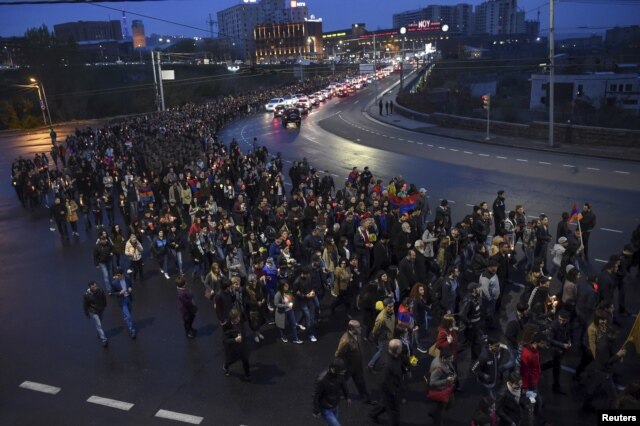
“We are much criticized in Azerbaijan,” the figher said. “There is a reason why we came here. The cause is to be found in Azerbaijan itself. We are pressured and not accepted as people. The media speaks against us, calling us Wahhabis. The police shave our beards. Therefore, we decided to go to Syria.”
Maxim Shevchenko, a prominent Russian journalist and editor-in-chief of the Caucasus Politics (Kavpolit) news agency, said, “The Azeri government is frequently criticized for harsh treatment of religious activists. There is no tolerance towards Islamist extremism.”
Station owner denounces Azerbaijan
After the LifeNews TV crew was deported from Azerbaijan, the station’s founder and owner Aram Gabrielyanov, a Russian of Armenian extraction, denounced Azerbaijan’s government via Twitter, calling it “a clique of corrupt, stupid politicians, sitting in the pocket of the stupid fascist Erdogan.”
Although Gabrielyanov, who is at the helm of a growing media empire in Russia, denies any ties to the Russian government, his loyalty to President Putin is no secret.
In numerous interviews, he has referred to Putin as “Papa Natsii” – the father of the nation.
In May 2014, Putin recognized Gabrelyanov’s contribution to Russia’s efforts against Ukraine by decorating him with the Order of Honor, which is usually reserved for those who have directly participated in combat.
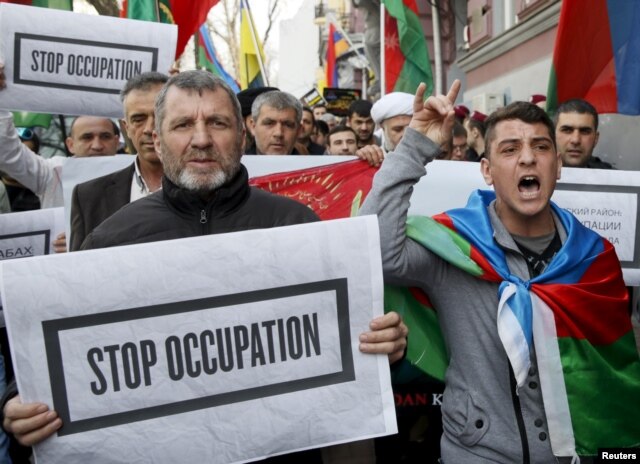
Some experts say Gabrelyanov’s political preferences and apparent participation in the Kremlin’s information wars cast doubt on the objectivity of LifeNews’ reporting.
Journalist Shevchenko said the LifeNews report alleging that Azerbaijan is using IS militants in the fight against Armenia is “a hideous lie based on gossip.”
Still, he praised the “bravery” of LifeNews’ journalists in the field. He said they “actually provided quality reporting from the both sides of the conflict zone.”
Questions news report
Like Shevchenko, Goble questions the veracity of the LifeNews report alleging the involvement of Azeri IS militants in the Nagorno-Karabakh fighting.
“I think it was invented,” he said, noting that the Azerbaijani government is very careful “in making sure that the country’s military and law enforcement is not infected by radicalization.”
“It is clear that there are people in Moscow who are interested in discrediting Azerbaijan and that was part of it,” Goble said.
Two days before the sides reached a cease-fire, an IS-style video appeared on the Internet claiming to show the beheading of an Armenian Yezidi soldier by a person wearing an Azeri military uniform.
In the video, which was posted on VKontakte, a Russian social network similar to Facebook, the person in the uniform is holding what appears to be a head in his hands.
VOA could not verify the veracity of the video. Azerbaijani officials said it was fabricated.
LifeNews, however, said the video supports its claims that IS militants are fighting on the Azeri side in Nagorno-Karabakh.

























